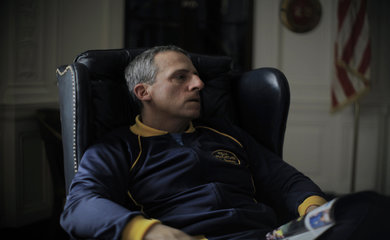Marcus Aurelius, the last of the Five Good Emperors, commented that “the art of living is more like wrestling than dancing.” What is more tragic than the forlorn shadow of a fallen athlete stalking through an America that has forgotten his past glories on the field of sporting excellence? The jock once so revered by classmates, teachers and horror movies now cast asunder by age and doubt, forced to make ends meet by whoring himself for twenty dollars a pop, delivering ‘motivational” speeches to elementary school students who couldn’t care less.
For former Olympic gold medal wrestler Mark Schultz, it’s worse than that. Mark lives in the Stars and Stripes shadow of his older brother Dave, himself an Olympic champion. Dave is an affable family man who everyone loves, everyone remembers-just look at the desperate pain etched onto Mark’s face when he has to submit to Dave in a training bout. He loves his brother but cannot forgive him for being born first and stunting his own emotional intelligence. When the pair train in Dave’s gym, slabs of muscle jostle for more than just physical position. We are witnessing sweaty sibling rivalry, sneaker-silent machismo that bonds men through movement and ritual.
Away from Dave, Mark inhabits a bleak netherworld of failed Americana. He eats solitary meals in his car or home, humourless fast food bleached of all colour and flavour. Director Bennett Miller wants us to cry for Mark, a Titan in exile with a hang-dog expression and a cauliflower ear, a mutt snuffling the ground because he no longer has the pedigree to look anyone in the eye. Mark is the wrong side of the dam looking up at the miracle of Reaganomics as the trickle down effect collects and pools behind thousands of tons of Republican disdain. All Mark can do is straighten his Gold Medal.
How the elite pick their moments to indulge their petty fantasies. Mark’s phone rings with an offer. Would he like to meet John Eleuthère du Pont, heir to the du Pont chemical fortune forged out of, “America’s need for ammunition,” an unquenchable thirst that kills all living things, especially poor Americans. Mark is monosyllabic so it’s difficult to tell if he’s intrigued or just too defeated to say no to the summons of complete stranger. Then again he’s whisked away in a helicopter and landed in the middle of du Pont’s illustrious Foxcatcher estate that has an eerie sense of entitlement, the main building referred to as “the big house.”
“What do you hope to achieve, Mark?” asks John in his trophy room. John du Pont has the air of a little emperor and the nose of a great caricature. He looks down it at Mark with just enough doubt in his superiority to make him vulnerable. His teeth hibernate, only emerging when they need to reveal a certain grotesque quality that only well-bred vermin could possibly possess. His speech pattern has an alarming quality, like a series of random mantraps filled with honey, quietly sweet then excruciating. “I want to be the best in the world,” offers Mark respectfully. “We as a nation failed to honour you,” replies John before offering Mark a chance to live, train and earn at Foxcatcher.
Why John wants to surround himself with a harem of world-class wrestlers is anyone’s guess. His mother sees wrestling as a “low sport,” whilst she indulges herself in the sport of kings, her horses in her eyes worth hundreds of thousands of dollars more than John’s human stock. John wants to give America its heroes back, training them in his own skewed image amongst the autumnal rot of Foxcatcher. Mark is emotionally stunted and little more than a child and as a consequence is gradually groomed by his rich mentor. At times such is Mark’s childlike qualities we feel that he is at the mercy of a pedophile exploiting his vulnerability, his search for a father figure that John personally writes into his own self-aggrandizing speeches.
Was John’s courtship of Mark just a wicked ploy to lure the brother he really coveted? Dave finally uproots his family to lead the Foxcatcher and USA wrestling teams from under the watchful eye of John. Yet for all John’s Napoleonic speeches staged for his disapproving mother or his privately funded documentaries he cannot fully usurp Dave’s easygoing leadership. John pontificates, “Coach is a father. Coach is a mentor. Coach has great power on an athlete’s life.” Is John privately exorcising his own childhood demons or exercising his divine right over working-class men that are less fortunate than him? Coach as the Holy Trinity?
What’s beyond doubt is that “Foxcatcher” is a morbidly complex, American Gothic horror story that chills to the very marrow because it is true. The triumvirate of outstanding performances of Channing Tatum as Mark Schultz, Steve Carell as John du Pont and Mark Ruffalo as Dave Schultz form a compelling love triangle that shifts and reforms throughout the length of the entire film. If living is wrestling as depicted in “Foxcatcher” then it is punishing, grueling and cruel in the extreme.

